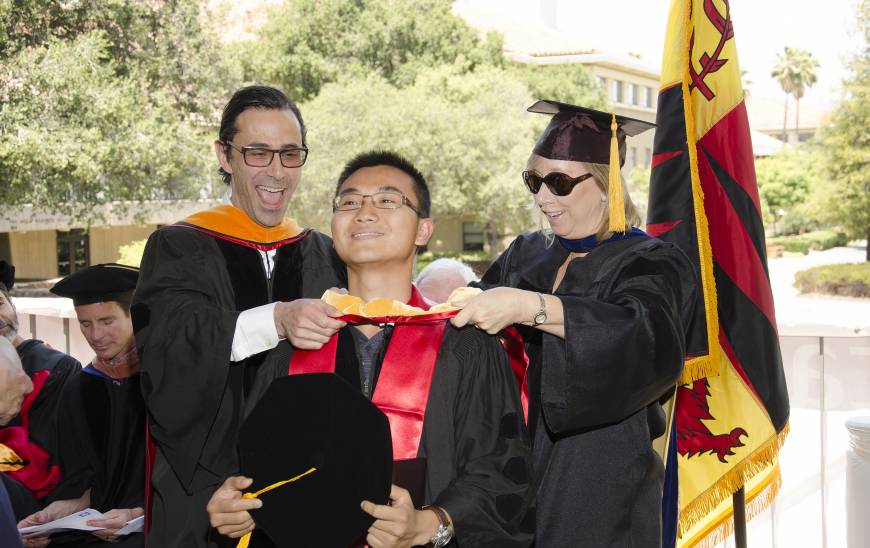The Stanford School of Earth, Energy & Environmental Sciences is now part of the Stanford Doerr School of Sustainability.
This page is currently being maintained for archival purposes only. For the latest information, please visit us here.
Earth Sciences graduates focused on global energy future
2014 PhD recipients are well positioned to tackle the most pressing energy issues facing their generation, from carbon capture and storage to shale gas and providing power to India’s growing population.
By
Ker Than and Nancy Peterson
Stanford School Of Earth Sciences
June 27, 2014
Stacy Geiken

Boxiao Li receives his PhD hood from Energy Resources Engineering advisors Prof. Hamdi Tchelepi (left) and Prof. Sally Benson. Li received a Henry J. Ramey Fellowship Award for Outstanding Research.
Today’s students have eyes wide open when it comes to the resource challenges facing the world. So it’s no surprise that many in the Stanford School of Earth Sciences focus their studies on energy.
“In our school, we know that Planet Earth is our business,” Dean Pam Matson recently told this year’s graduating class.
Working with faculty from across the school, their aim is to determine ways to meet the energy needs of a growing and more consuming human population without negatively impacting the climate and other resources such as water. Many are using advanced tools and computational techniques to discover and produce oil and gas with a smaller environmental footprint and make those resources cleaner. Others investigate ways that fossil fuels–and natural gas in particular–might serve as a “bridge fuel” to a “no-carbon” energy future that is dominated by renewable sources such as solar, geothermal, and wind power. Interdisciplinary approaches combine academic fields in the natural and Earth sciences with business, law and the social sciences. These multi-pronged approaches can involve investigating finite and renewable energy resources, technologies for improved efficiency, and policy solutions to energy challenges.
“You have something special in that basket of knowledge–something that many of us from earlier generations did not have,” Matson said. “You have learned to think about and deal with complexity–the interconnectivity of things, and the interactions and feedbacks and trade-offs that result. Access to energy is linked to minerals, linked to water availability, linked to food production and so on, and what we do in one area can affect another.”
In the class of 2014, nearly a third of the 45 PhDs awarded by the School of Earth Sciences related to energy. The dissertations dove deep into a wide range of topics, including carbon capture and storage, accessing shale gas, oil reservoir simulation, modeling the energy future of India, geothermal reservoir characterization, and comparing homeowner adoption rates of solar-PV panels in California cities. Masters and bachelor degree recipients likewise concentrated on energy, including those who pursued the Energy, Science & Technology track in Earth Systems.
After receiving their degrees, the 2014 graduates are prepared for a number of options, ranging from continuing their education and research, working in industry, accepting academic appointments or working for governments or non-profit organizations.
Energy research and teaching occurs across all departments and programs in the School of Earth Sciences, with the largest concentration of students, historically as well as today, in Energy Resources Engineering. Yet faculty and students from Geophysics, Geological and Environmental Sciences and Environmental Earth System Science, and the school’s two interdisciplinary degree programs–Earth Systems and the Emmett Interdisciplinary Program in Environment and Resources–seek to answer pressing science and engineering questions about sourcing, producing and consuming energy. Numerous Earth Sciences faculty are also fellows in the Precourt Institute for Energy, including director Sally Benson, professor of Energy Resources Engineering, and assistant director Roland Horne, the Thomas Davies Barrow professor in the School of Earth Sciences.



